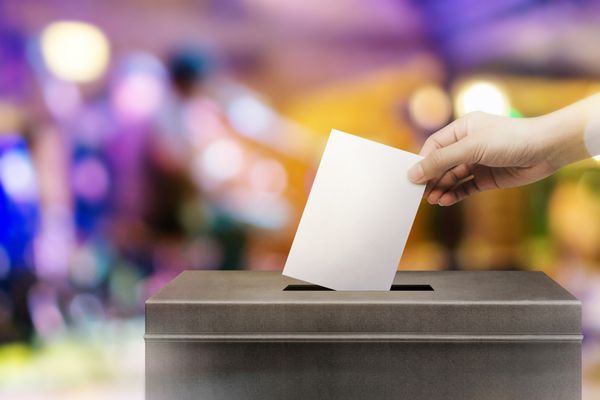2.1.1
Functions & Features of UK Political Parties
What is a Political Party?
What is a Political Party?
Political parties act in government to represent the public.


Political parties introduction
Political parties introduction
- A political party is a group of similarly minded people who aim to achieve their objectives by fielding candidates for election to political office.
- A political party puts the policies it aims to pass into law in its manifesto, which is a document listing policy pledges.
- The party that wins power as a result of electoral victory earns a mandate, which is when a political party or decision-maker has the authority to make decisions or put policies in place.
Functions of UK Political Parties
Functions of UK Political Parties
Political parties in the UK have a number of key roles which ensure that the UK’s system of representative democracy can work in practice.


Government and opposition roles
Government and opposition roles
- Parties ensure that a single government is formed as a result of the general election which is able to safely pass its legislation through the House of Commons.
- Parties also perform the role of the opposition parties who check the actions of the government and hold it to account.


Representation
Representation
- A key role of political parties is representing their members.
- The Labour Party’s membership has been increasing under Jeremy Corbyn, growing by nearly 200,000 members since December 2015.
- But, overall party membership has been declining since the 1950s - so this role has changed in recent years.
- Political parties represent the wider public in Parliament, regional parliaments and assemblies, and in local councils.


Political participation
Political participation
- Political parties allow people to have a greater participation in politics by becoming members of the party and so increase their involvement in the democratic process.
- Parties also aim to increase political engagement by educating citizens on political issues.
Functions of UK Political Parties 2
Functions of UK Political Parties 2
Political parties in the UK have a number of key roles which ensure that the UK’s system of representative democracy can work in practice.


Recruiting politicians
Recruiting politicians
- Parties recruit individuals into the political system and choose those individuals they believe to be most suitable to stand for public office.
- Parties also play a role in the promotion of politicians, with those who are seen as having the qualities most suitable for national leadership roles promoted to more senior positions within the party.
- Prospective MPs have to apply in writing and sit interviews for selection.
- Some parties have all-women shortlists for some elections.


Creating policy
Creating policy
- Political parties establish policies which they believe are in the interests of voters and meet their needs.
- These policy proposals are presented to voters in the form of a party manifesto.
- In the 2017 elections, the Conservatives promised a balanced budget by 2025 and an orderly Brexit.
- Labour promised the end of austerity, tax increases, and the abolition of tuition fees for university.


Choice at elections
Choice at elections
- Political parties offer voters a clear choice at elections, ensuring that voters are able to support the party whose policies most appeal to them.
1Democracy & Participation
1.1Representative & Direct Democracy
1.2Wider Franchise & Suffrage
1.3Pressure Groups & Other Influences
2Political Parties
2.1How Political Parties Work
2.2Established Political Parties
2.3Emerging & Minor Political Parties
3Electoral Systems
3.1Different Electoral Systems
3.2Referendums & How They Are Used
4Voting Behaviour & the Media
5Conservatism
5.1Conservatism: Core Ideas & Principles
5.2Conservatism: Differing Views & Tensions
6Liberalism
6.1Liberalism: Core Ideas & Principles
6.2Differing Views And Tensions Within Liberalism
7Socialism
7.1Socialism: Core Ideas & Principles
7.2Differing Views And Tensions Within Socialism
8The UK Constitution
8.1Nature & Sources of UK Constitution
8.2Constitutional Change since 1997
8.3Role & Powers of Devolved UK Bodies
9The UK Parliament
9.1Houses of Parliament
9.2Comparative Powers
9.3Legislative Process
10The Prime Minister & the Executive
10.1The Executive
10.2Ministerial Responsibility
10.3Prime Minister & the Cabinet
10.3.1Role of the Prime Minister
10.3.2Prime Minister's Powers
10.3.3Limits on the Prime Minister's Powers
10.3.4Role of the Cabinet
10.3.5Prime Minister & Cabinet: Relations
10.3.6Prime Minister & Cabinet: Balance of Power
10.3.7Prime Minister & Cabinet: Case Studies
10.3.8End of Topic Test - PM & Cabinet
10.3.9Top Grade AO3/4 - PM & Cabinet
11Relationships Between Government Branches
11.1The Supreme Court
11.2Parliament & Executive Relations
11.3The European Union & the UK
11.4Sovereignty in the UK Political System
12US Constitution & Federalism
12.1Nature of the US Constitution
12.2Principles of the US Constitution
12.3Federalism
13US Congress
13.1Structure of Congress
13.2Functions of Congress
14US Presidency
14.1Presidential Power
14.2The Presidency
14.3Interpretations & Debates of the US Presidency
15US Supreme Court & Civil Rights
15.1Nature & Role of Supreme Court
15.2Supreme Court Appointment Process
15.3The Supreme Court & Public Policy
15.4Protection of Civil Liberties & Rights
15.5Debates & Interpretations of the Supreme Court
16US Democracy & Participation
16.1Presidential Elections
16.2Electoral College
16.3Electoral Campaigns
16.4Incumbency
16.5Democrats & Republicans
16.6Internal Conflict & Ideology
16.7Support & Demographics
17Comparing Democracies
17.1Theoretical Approaches
17.2UK & USA Similarities & Differences
17.2.1Constitution: Nature
17.2.2Constitution: Provisions & Principles
17.2.3Federal System & Devolution
17.2.4Legislative: Lower Houses of Government
17.2.5Legislative: Upper Houses of Government
17.2.6Legislative: Powers & Functions
17.2.7Executive
17.2.8Supreme Court
17.2.9Supreme Court: Judicial Independence
17.2.10Civil Rights
17.2.11Civil Rights: Interest Groups
17.2.12Party Systems & Parties
17.2.13Campaign Finance & Pressure Groups
17.2.14End of Topic Test - Comparing UK & US
17.2.15Application Questions - UK & USA
18Feminism
18.1Feminism: Core Ideas & Principles
18.2Different Types of Feminism
19Nationalism
19.1Nationalism: Core Ideas & Principles
19.2Different Types of Nationalism
Jump to other topics
1Democracy & Participation
1.1Representative & Direct Democracy
1.2Wider Franchise & Suffrage
1.3Pressure Groups & Other Influences
2Political Parties
2.1How Political Parties Work
2.2Established Political Parties
2.3Emerging & Minor Political Parties
3Electoral Systems
3.1Different Electoral Systems
3.2Referendums & How They Are Used
4Voting Behaviour & the Media
5Conservatism
5.1Conservatism: Core Ideas & Principles
5.2Conservatism: Differing Views & Tensions
6Liberalism
6.1Liberalism: Core Ideas & Principles
6.2Differing Views And Tensions Within Liberalism
7Socialism
7.1Socialism: Core Ideas & Principles
7.2Differing Views And Tensions Within Socialism
8The UK Constitution
8.1Nature & Sources of UK Constitution
8.2Constitutional Change since 1997
8.3Role & Powers of Devolved UK Bodies
9The UK Parliament
9.1Houses of Parliament
9.2Comparative Powers
9.3Legislative Process
10The Prime Minister & the Executive
10.1The Executive
10.2Ministerial Responsibility
10.3Prime Minister & the Cabinet
10.3.1Role of the Prime Minister
10.3.2Prime Minister's Powers
10.3.3Limits on the Prime Minister's Powers
10.3.4Role of the Cabinet
10.3.5Prime Minister & Cabinet: Relations
10.3.6Prime Minister & Cabinet: Balance of Power
10.3.7Prime Minister & Cabinet: Case Studies
10.3.8End of Topic Test - PM & Cabinet
10.3.9Top Grade AO3/4 - PM & Cabinet
11Relationships Between Government Branches
11.1The Supreme Court
11.2Parliament & Executive Relations
11.3The European Union & the UK
11.4Sovereignty in the UK Political System
12US Constitution & Federalism
12.1Nature of the US Constitution
12.2Principles of the US Constitution
12.3Federalism
13US Congress
13.1Structure of Congress
13.2Functions of Congress
14US Presidency
14.1Presidential Power
14.2The Presidency
14.3Interpretations & Debates of the US Presidency
15US Supreme Court & Civil Rights
15.1Nature & Role of Supreme Court
15.2Supreme Court Appointment Process
15.3The Supreme Court & Public Policy
15.4Protection of Civil Liberties & Rights
15.5Debates & Interpretations of the Supreme Court
16US Democracy & Participation
16.1Presidential Elections
16.2Electoral College
16.3Electoral Campaigns
16.4Incumbency
16.5Democrats & Republicans
16.6Internal Conflict & Ideology
16.7Support & Demographics
17Comparing Democracies
17.1Theoretical Approaches
17.2UK & USA Similarities & Differences
17.2.1Constitution: Nature
17.2.2Constitution: Provisions & Principles
17.2.3Federal System & Devolution
17.2.4Legislative: Lower Houses of Government
17.2.5Legislative: Upper Houses of Government
17.2.6Legislative: Powers & Functions
17.2.7Executive
17.2.8Supreme Court
17.2.9Supreme Court: Judicial Independence
17.2.10Civil Rights
17.2.11Civil Rights: Interest Groups
17.2.12Party Systems & Parties
17.2.13Campaign Finance & Pressure Groups
17.2.14End of Topic Test - Comparing UK & US
17.2.15Application Questions - UK & USA
18Feminism
18.1Feminism: Core Ideas & Principles
18.2Different Types of Feminism
19Nationalism
19.1Nationalism: Core Ideas & Principles
19.2Different Types of Nationalism
Unlock your full potential with Seneca Premium
Unlimited access to 10,000+ open-ended exam questions
Mini-mock exams based on your study history
Unlock 800+ premium courses & e-books